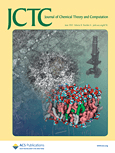
Journal of Chemical Theory and Computation
Scope & Guideline
Catalyzing Progress in Computational Techniques
Introduction
Aims and Scopes
- Computational Chemistry:
The journal focuses on computational methods and their applications in chemistry, targeting areas such as quantum chemistry, molecular dynamics, and statistical mechanics. - Molecular Modeling:
Research involving the modeling of molecular systems using theoretical frameworks to predict molecular behavior, properties, and interactions. - Machine Learning in Chemistry:
An emerging focus on integrating machine learning techniques with traditional computational methods to enhance predictive accuracy and efficiency. - Quantum Chemistry:
Papers often delve into quantum mechanical approaches, including density functional theory (DFT), coupled cluster methods, and quantum dynamics. - Interdisciplinary Approaches:
JCTC encourages interdisciplinary research that combines chemistry with fields such as materials science, biology, and environmental science. - Benchmarking and Method Development:
A significant emphasis on benchmarking new methods against established standards to validate their accuracy and applicability in practical scenarios.
Trending and Emerging
- Machine Learning Applications:
The integration of machine learning techniques into computational chemistry is trending, with researchers applying these methods to enhance predictive capabilities and optimize molecular simulations. - Quantum Computing in Chemistry:
An increasing number of studies are exploring the application of quantum computing to solve complex chemical problems, indicating a growing interest in this cutting-edge field. - Enhanced Sampling Techniques:
Research focusing on enhanced sampling methods, such as metadynamics and adaptive biasing, is on the rise, reflecting a need for more efficient exploration of complex energy landscapes. - Multiscale Modeling Approaches:
There is a growing trend towards multiscale modeling that combines different levels of theory to address complex chemical systems, allowing for more accurate and comprehensive simulations. - Coupled Quantum-Classical Methods:
The development of hybrid methods that integrate quantum mechanical and classical approaches is gaining traction, particularly for studying systems with significant electronic correlation. - Nonadiabatic Dynamics:
Research into nonadiabatic processes, particularly in the context of photochemistry and excited-state dynamics, is becoming more prevalent, reflecting the importance of these phenomena in chemical reactions.
Declining or Waning
- Traditional Molecular Dynamics:
While still important, traditional, non-enhanced molecular dynamics simulations are being overshadowed by more sophisticated sampling techniques and hybrid methods that combine various approaches. - Empirical Force Field Models:
As machine learning and quantum methods gain traction, reliance on classical empirical force fields for molecular simulations appears to be decreasing, with fewer studies focusing solely on these methods. - Static Analysis Techniques:
The focus on static energy calculations and analyses is waning, as dynamic, time-resolved studies gain popularity, reflecting a shift towards understanding molecular processes over time.
Similar Journals
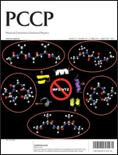
PHYSICAL CHEMISTRY CHEMICAL PHYSICS
Pioneering Research in Interdisciplinary Chemistry and PhysicsPhysical Chemistry Chemical Physics is a premier interdisciplinary journal published by the Royal Society of Chemistry, dedicated to advancing the fields of physical chemistry and chemical physics. With an impressive impact factor and categorized in the Q2 quartiles for both Physical and Theoretical Chemistry and Physics and Astronomy, this journal serves as a vital platform for the dissemination of high-quality research findings from 1999 through 2024. Based in the United Kingdom, the journal is committed to providing open access to its articles, enhancing the visibility and accessibility of research to a global audience. Researchers, professionals, and students alike are encouraged to contribute to this esteemed journal, ensuring impactful discussions and significant advancements in the understanding of chemical and physical phenomena. With strong Scopus rankings underscoring its relevance, Physical Chemistry Chemical Physics stands out as an essential resource for specialists striving to innovate and excel within these dynamic fields.

Annual Review of Physical Chemistry
Exploring the Depths of Physical Chemistry KnowledgeAnnual Review of Physical Chemistry, published by Annual Reviews, stands as a premier source of comprehensive review articles in the field of physical chemistry. With a prestigious impact factor and a strong reputation reflected in its Q1 rankings in both Physical and Theoretical Chemistry and Medicine (Miscellaneous), this journal is essential for researchers seeking to stay at the forefront of advancements in the discipline. Covering a wide array of topics, the Annual Review of Physical Chemistry synthesizes the latest findings, trends, and methodologies, providing a vital resource for professionals and students alike. Although it does not offer open access, its scholarly rigor and in-depth analyses ensure it occupies a critical space in academia. Its consistent publication since 1975 guarantees that it has historical significance and relevance, making it a cornerstone for those engaged in cutting-edge research within the realm of physical chemistry.
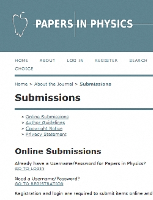
Papers in Physics
Fostering collaboration and knowledge in the realm of physics.Papers in Physics is a reputable, open-access journal dedicated to advancing knowledge in the diverse fields of physics, materials science, and theoretical chemistry. Published by the Instituto de Física Líquidos y Sistemas Biológicos in Argentina, this journal has been disseminating groundbreaking research since 2009 and has quickly established its place within the academic community. With a consistent commitment to accessibility, it serves as a vital resource for professionals, researchers, and students alike, enriching the discourse with innovative studies and findings. As recognized by its 2023 Scopus rankings, the journal occupies Q3 quartile positions across several categories, including Materials Science and Physics, illustrating its relevance and impact in the scientific landscape. The journal's breadth of research encompasses interdisciplinary approaches, fostering collaboration among scholars from various domains. Whether you are seeking to publish your own research or exploring the latest developments in physics and its related fields, Papers in Physics stands as a critical platform for the dissemination of knowledge and the advancement of science.
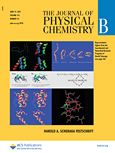
JOURNAL OF PHYSICAL CHEMISTRY B
Unveiling Innovations in Materials ScienceJournal of Physical Chemistry B, published by the American Chemical Society, is a leading international platform dedicated to advancing our understanding of physical chemistry and its applications in various interdisciplinary fields. With an impressive 2023 Impact Factor, and categorized in Q1 for Physical and Theoretical Chemistry as well as Surfaces, Coatings and Films, this journal showcases cutting-edge research that contributes significantly to materials science, supporting the innovative development of new materials and technologies. The journal, established in 1997 and converging its years of publication to 2024, maintains rigorous peer-review standards and is accessible to a global audience, enabling the dissemination of pivotal research findings. Moreover, it is renowned for its comprehensive coverage in the realms of materials chemistry and miscellaneous medical applications, making it a vital resource for researchers, professionals, and students alike in their pursuit of excellence in scientific inquiry.
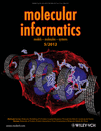
Molecular Informatics
Unlocking Insights Through Molecular ModelingMolecular Informatics is a prestigious journal published by WILEY-V C H VERLAG GMBH, dedicated to advancing the fields of computational analysis and molecular modeling. As a key resource in the realms of Computer Science Applications, Drug Discovery, Molecular Medicine, Organic Chemistry, and Structural Biology, this journal is recognized for its significant contributions and is ranked in the Q2 and Q3 categories across multiple disciplines, positioning it among the leading journals for researchers and academics. With an impressive track record since its inception in 2010 and converging its contributions until 2024, Molecular Informatics aims to bridge the gap between computational techniques and biological applications, promoting interdisciplinary collaboration and innovation. Accessible to a global audience, the journal reflects a commitment to advancing science through open access options, making cutting-edge research available to students, professionals, and decision-makers alike. This journal serves as an indispensable platform for disseminating high-quality research and fostering the development of new theoretical and practical frameworks in molecular informatics.

JOURNAL OF MOLECULAR MODELING
Exploring the Depths of Computational ChemistryJOURNAL OF MOLECULAR MODELING, published by Springer, is a pivotal resource for researchers and professionals in the fields of chemistry, computer science, and molecular sciences. The journal's ISSN is 1610-2940, with an E-ISSN of 0948-5023, reflecting its commitment to disseminating cutting-edge research from 1996 to 2024. Although the journal does not operate under an Open Access model, it remains an invaluable platform for the publication of innovative studies related to computational methods, theoretical chemistry, and molecular simulations. With a notable categorization across multiple quartiles—including Q4 in Catalysis and Q3 in Computational Theory and Mathematics—the journal holds a distinct rank in Scopus, highlighting its influence and contribution to the discipline. The importance of this journal lies in its ability to bridge the gap between theoretical understanding and practical applications, making it essential reading for students and scholars seeking to advance their knowledge and research in molecular modeling.
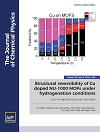
JOURNAL OF CHEMICAL PHYSICS
Bridging Chemistry and Physics for Tomorrow's InnovationsJOURNAL OF CHEMICAL PHYSICS, published by AIP Publishing, stands as a premier scholarly source within the realms of physical and theoretical chemistry, as well as physics and astronomy. With an enduring history dating back to 1933 and converging until 2024, this journal has established itself as a cornerstone of the scientific community, evidenced by its prestigious Q1 categorization in multiple fields, including medicine and general physics. It is ranked 37th out of 243 in the general physics and astronomy category and holds a commendable 39th position in physical and theoretical chemistry according to Scopus rankings, highlighting its significant impact in these disciplines. Although not an open-access journal, it caters to a wide audience of researchers, professionals, and students seeking to deepen their understanding of the interactions and dynamics of chemical systems. With its expertly curated content, the JOURNAL OF CHEMICAL PHYSICS continues to play a vital role in advancing knowledge and fostering innovation across its core subjects.
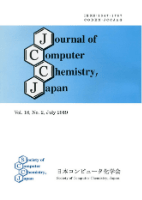
Journal of Computer Chemistry-Japan
Connecting Academia and Industry through Rigorous ResearchJournal of Computer Chemistry-Japan, published by SOC COMPUTER CHEMISTRY, JAPAN, is a dedicated platform for researchers and professionals in the interdisciplinary fields of computational chemistry and chemical informatics. Though the journal does not currently provide open access, it maintains a rigorous selection process for contributions, ensuring the publication of high-quality, peer-reviewed research. With a focus on advancing computational methods and techniques to solve complex chemical problems, the journal aims to bridge the gap between theoretical chemistry and practical applications, making it an invaluable resource for academics and industry professionals alike. As the complexity of chemical systems continues to rise, the relevance of computational approaches in material science, drug discovery, and molecular modeling has never been more critical. Researchers are encouraged to engage with the contents of this journal, which showcases innovative studies, methodologies, and discussions relevant to the evolving landscape of computer-aided chemistry.

Results in Chemistry
Illuminating the Path of Chemical InnovationResults in Chemistry is a prominent journal published by Elsevier, dedicated to fostering innovation and disseminating cutting-edge research in the field of chemistry. With an ISSN of 2211-7156, this open-access journal has been committed to making scientific knowledge widely available since 2019, aligning with the global trend towards accessibility in research. Based in the Netherlands, it features interdisciplinary studies that span the breadth of general chemistry, contributing significantly to the academic dialogue within the scientific community. Despite currently holding a Q3 ranking in the miscellaneous category of chemistry and occupying the 228th position out of 408 in Scopus rankings, the journal is poised for growth, aiming to enhance its impact and visibility. Researchers, professionals, and students alike will find invaluable resources and insights within its pages, making Results in Chemistry an essential platform for those looking to stay abreast of advancements and trends in chemistry research up to the year 2024.
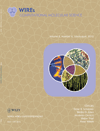
Wiley Interdisciplinary Reviews-Computational Molecular Science
Empowering Discoveries with Cutting-edge Computational TechniquesWiley Interdisciplinary Reviews: Computational Molecular Science is a premier journal published by WILEY, dedicated to the intersection of computational techniques and molecular science. Boasting an impressive impact factor and consistently ranking in the Q1 category across several key disciplines including Biochemistry, Computational Mathematics, Computer Science Applications, Materials Chemistry, and Physical and Theoretical Chemistry, this journal plays a crucial role in disseminating high-quality research that bridges multiple fields. With its focus on providing a platform for interdisciplinary dialogue and innovative computational solutions, it serves as an essential resource for researchers, professionals, and students eager to push the boundaries of molecular science. While the journal does not currently offer open access, it remains a vital conduit for scholarly communication, fostering advancements in understanding molecular interactions through computational methods. The journal is based in the United States, contributing to its global outreach and impact in the scientific community.